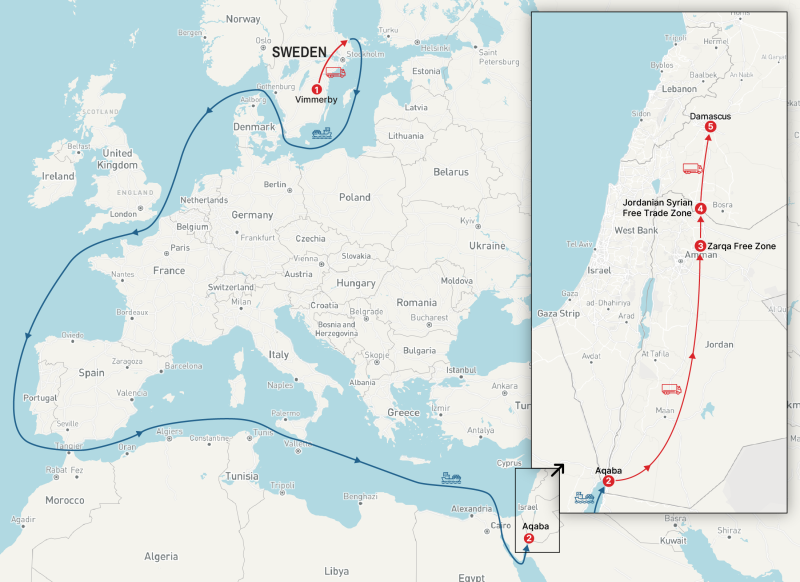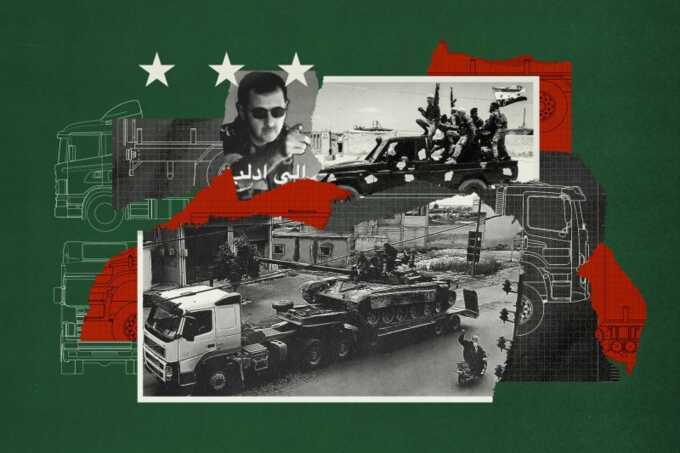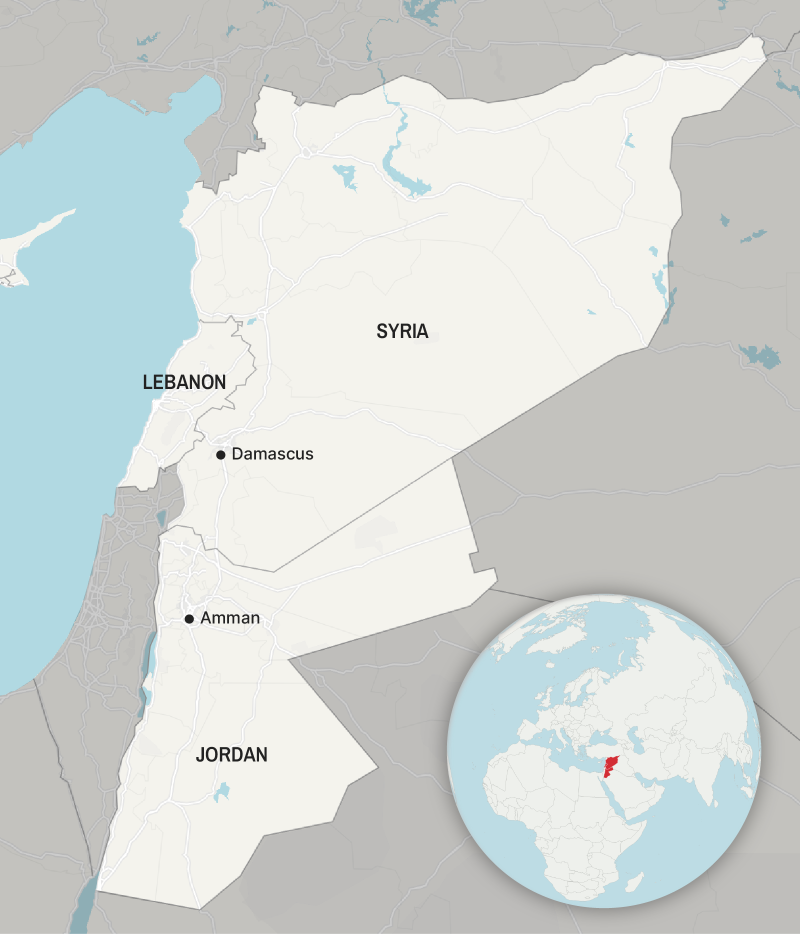The Syrian army is getting its hands on new-looking EU-branded trucks. An undercover investigation found evidence of a secretive supply chain routing vehicles from Europe to Syria through neighboring countries such as Jordan and Lebanon.
At first glance, these videos are typical Syrian government propaganda — the sort of thing that’s flooded state TV over more than a decade of civil war.
Large trucks hauling tanks down dusty roads past rifle-toting soldiers.
In one corner, an image of President Bashar Al-Assad appears in sunglasses and military fatigues, urging his troops on “to Idlib,” one of the country’s last pockets of rebel-held territory.
Look closer, though, and you’ll see something out of place.
The trucks include a couple of fresh-looking G460s, a heavy duty truck made by the Swedish manufacturer Scania.
How did they get there?
Syria’s civil war is one of the most devastating conflicts of the 21st century. More than half a million people have been killed and about 12 million forced to flee their homes.
Since the start of the conflict in 2011, the European Union and its member states have imposed some of the world’s heaviest sanctions against Syria, targeting perpetrators of violence, swathes of the economy, and barring the export of certain goods to the country. The bloc has made clear that the goal of these measures is to stop the Assad regime from using violence against its own people.
But sanctions are a tricky business. Enforcement, which is the responsibility of EU countries, can be patchy, the exact rules are often open to interpretation, and loopholes abound. While exporting ordinary road trucks to Syria doesn’t explicitly violate sanctions, images like the one in the Idlib video are not the sort of thing European officials want to see.
The people selling trucks know this. Ask a dealer in the EU to ship a truck directly to Syria, and you’re all but certain to get turned down.
But that won’t necessarily be the end of the conversation. Some may offer you an alternative route, reporters found.

Ali Ibrahim/Siraj
EU parliament in May 2024, discussing the future of Syria.
To supply its war effort, Syria’s government has been heavily dependent on its ally, Russia. But as recently as 2018, videos broadcast by state outlets and shared on social media have shown the Syrian army is getting its hands on new-looking trucks with EU brands such as Mercedes, Scania, Volvo, and Iveco.
The Idlib video shows Scania trucks, including the G460 model, as well as possibly G480 and R440 models, most of them carrying tanks. The video’s commentary says the trucks are being used by the Tiger Forces, an elite Russia-backed unit that has played key roles in high-profile offensives. It was posted by a pro-regime Facebook page in 2021, though the date it was filmed could not be confirmed.
Syria doesn’t publish army procurement information, so it’s not possible to say how or when these specific trucks entered Syria. Some manufacturers outsource parts of their production process, meaning these trucks may not have been assembled in the EU.
But some similar vehicles do appear to be making their way from the EU via an indirect pipeline that passes through neighboring countries which are not subject to the same level of sanctions. Once in these countries, the trucks can be more easily transported to their final destination.
An undercover reporter conducted a dozen interviews with truck traders, shippers, and customs agents in Germany, Italy, Sweden, Syria, Jordan, and Lebanon. These intermediaries described in detail how trucks could be shipped from the EU to Syria through countries like Jordan and Lebanon, sometimes by paying bribes and falsifying paperwork along the way.
This circuitous supply chain is similar to routes through Belarus or Central Asia that have funneled goods into Russia since it was sanctioned for its 2022 invasion of Ukraine, helping supply the Kremlin’s war machine.
“Trucks may be non-military instruments but they do transport tanks and artillery,” said Ahmad Hamada, a military analyst and former Syrian army officer. “Such services to the regime represent death for civilians.”
The Syrian Ministry of Defense did not respond to requests for comment.
Traders: Key to the Supply Chain
Intermediaries such as traders and customs brokers are central to the trade.
Of the dozen such intermediaries OCCRP interviewed, eight said that shipping directly to Syria was impossible due to trade restrictions and that shipping manifests needed to avoid mentioning the country’s name.
When an undercover reporter contacted two EU-based traders to say he wanted to send Mercedes and Scania trucks from Sweden to a buyer in Damascus, they offered to help work around trade bans by shipping via Jordan, Lebanon, or the United Arab Emirates.
One of the traders, based in the southern Swedish town of Vimmerby, warned the reporter that Swedish authorities would block the shipment if they learned it was headed to Syria. “There are no boats going to Syria, there is an embargo, it is forbidden,” he said. (Sweden’s Foreign Ministry told OCCRP it was “crucial” that sanctions are adequately implemented but said Swedish authorities do not block shipments bound for Syria.)
Instead, the trader offered to help ship the trucks via Jordan. Once the vehicles were in the Middle East, they could be moved to free zones — special economic areas not subject to usual customs rules — and from there into Syria, he explained.

Edin Pašović
Trucks moving from Vimmerby in Sweden to the port of Aqaba in Jordan, then to the Zarqa free zone in Jordan, before heading to the joint Jordan-Syria free zone, and then to Damascus in Syria.
The Vimmerby trader suggested shipping the trucks to Jordan’s port of Aqaba on the Red Sea, and from there transporting them to the country’s Zarqa Free Zone east of Amman.
After filling out some paperwork, the trucks could then move north to the Jordanian-Syrian Joint Free Zone, located on the border.
From there, the transfer to Damascus would be straightforward: “We don’t even need to discuss it,” the trader said.
Moving the money was another matter. Since financial sanctions might prevent the buyer in Syria from making direct transfers to Europe, the trader advised that the buyer send money to an exchange house in Syria. The trader could then collect it at a corresponding exchange house in Jordan. "I will receive it, and I will organize everything,” he said.
The other trader, based in Germany, offered to connect the reporter with a Syrian trader based in the UAE who, he said, “may be able to take the trucks to Syria.”
Manufacturer Responses
Read more similar news:
Comments:
comments powered by Disqus

































